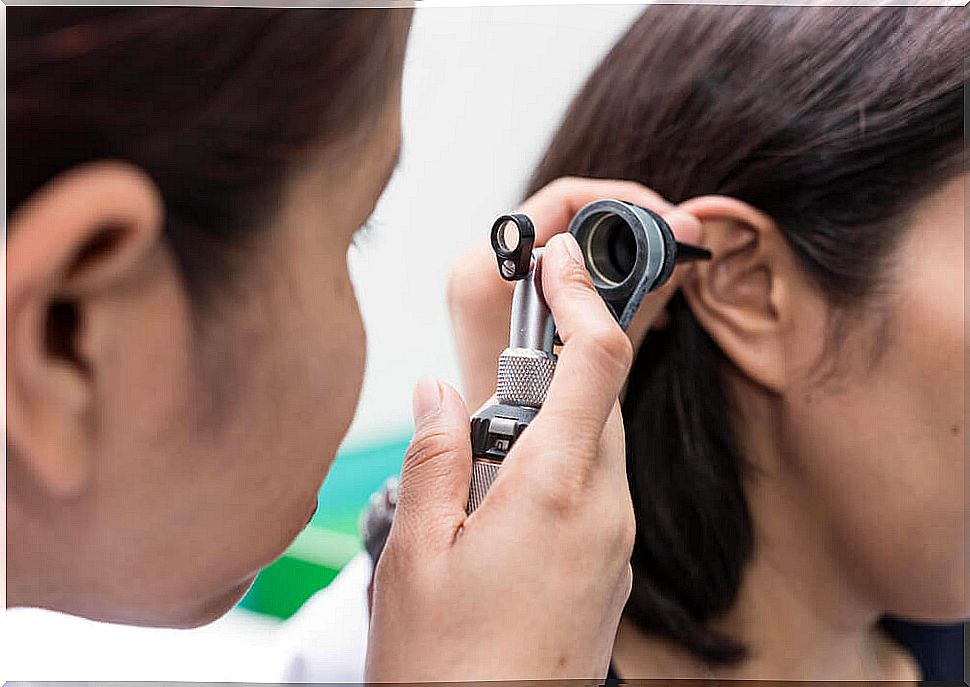Tips And Natural Plants To Prevent Deafness

Deafness is characterized by total or partial hearing loss. There is talk of hearing loss when it subsides, but you can still hear something, and deafness when no sound is heard. In this article we will talk about this condition and teach how to prepare some home remedies to prevent deafness and alleviate its symptoms.
Causes
Deafness has many causes. Some are curable and some are not. Here we will present the most common ones, with some considerations about their severity.
- Foreign bodies in the ear canal: water and ear wax. It is usually easily cured.
- Fluid in the middle ear due to an acute illness (pus). It’s curable if you don’t let it go too long.
- Shortness of breath in the middle ear due to blockage of the Eustachian tubes due to adenoid, cold, or phlegm. If not corrected, the eardrum sinks inwards. It’s curable.
- Arteriosclerosis of the blood vessels in the inner ear; causes necrosis or death of nerve endings.
- Eighth nerve inflammation or acute neuritis.
- Nerve destruction by poison, such as quinine.
- A ruptured eardrum leaves a permanent perforation. Deafness can only be partial.
- Catarrh, sick tonsils, adenoids, frequent colds, sore throat and obstructions in the nasal passages.
As soon as we realize that we are going deaf, we should see a doctor, preferably a specialist. He will be able to examine us carefully.
Symptoms
Symptoms suggestive of an onset of deafness can be easily noticed without much difficulty. Among them, we find:
- Need to focus too hard to listen to what other people say or ask them to repeat what they say.
- Ringing in the ears.
- Listen to others as if they were whispering.
- Itching due to the presence of some liquid.
- In more severe cases, severe pain may appear, more associated with rupture of nerve endings.
When there is sudden deafness, the person realizes why he begins to have cuts between what he hears. In children, the signs of suspected congenital deafness are:
- difficulty learning to speak
- learning problems
- Changes in your behavior
complications

This is a problem that can have a very significant effect on a person’s quality of life. The most reported problems among adults due to deafness are:
- Depression
- Anxiety
- Feeling that other people are angry
It is very common for most people affected by hearing loss or deafness to live with these difficulties for years before seeking treatment. Some of them never seek help, which can cause problems for those they live with at home or at work.
Tips
- It is advisable to avoid impulsive noises. Music should not be heard at more than 110 decibels as it can cause early hearing loss.
- No foreign objects or substances should be introduced into the ears as they can push the wax in and damage the eardrum.
- It is advisable to clean only the outer part of the ear with gauze or towel. Do not insert fingers for cleaning and scratching.
- We must be very careful when playing contact sports; they can cause trauma to the ear area and new problems.
- In case of continuous noise exposure, you should wear hearing protectors.
Natural plants to prevent deafness
Marjoram
This plant is recommended to treat hearing loss. Due to its hypotensive and anti-arteriosclerotic properties, it can help the person suffering from the disease as it regulates blood pressure.
Ingredients
- 1 tablespoon of marjoram (15 g)
- 1 cup of water (250 ml)
Preparation
- In a bowl, bring the water to a boil.
- When it boils, add the marjoram, cover and leave for another 2 minutes.
- Remove from heat and let stand for 5 minutes.
- It is recommended to drink two cups a day.
Onion

Due to its multitude of properties, it is very suitable for the blood, prevents the formation of clots, is antibiotic and analgesic.
Ingredients
- 1 onion
- 4 cups of water (1 liter)
Preparation
- Mash the onion and place in a bowl.
- Add the liter of water.
- Let it rest for 12 hours before consuming, so that it is well concentrated.
- Take three times a day.
Garlic
Garlic has excellent antibiotic and anti-inflammatory properties, which will be of great help in this type of situation.
Ingredients
- 1 clove of garlic
- 1 tablespoon of olive oil (15 ml)
Preparation
- Mash the garlic well into a paste.
- Heat the oil in a bowl and add the garlic.
- Press with a spoon to release your extractions.
- With an eyedropper, put three drops in each ear and repeat the application several times a week.
Ginkgo biloba
Due to its properties, it improves blood flow, increasing the oxygen supply to the brain. It is ideal for keeping your ears healthy and free from discomfort.
Ingredients
- 1 tablespoon of ginkgo biloba (15 g)
- 1 cup of water (250 ml)
Preparation
- In a saucepan, boil the water. When done, add the tablespoon of ginkgo biloba.
- Cover and let stand for 5 minutes.
- It is recommended to drink one cup a day.
Ear discomfort or lack of hearing usually occurs during old age, but there are many factors that lead to this. That’s why we must take care of our vital senses in order to lead a more comfortable life.
If you are already experiencing symptoms, the natural remedies taught above will be very helpful. However, if your case is very serious, it is better to see a specialist right away.








